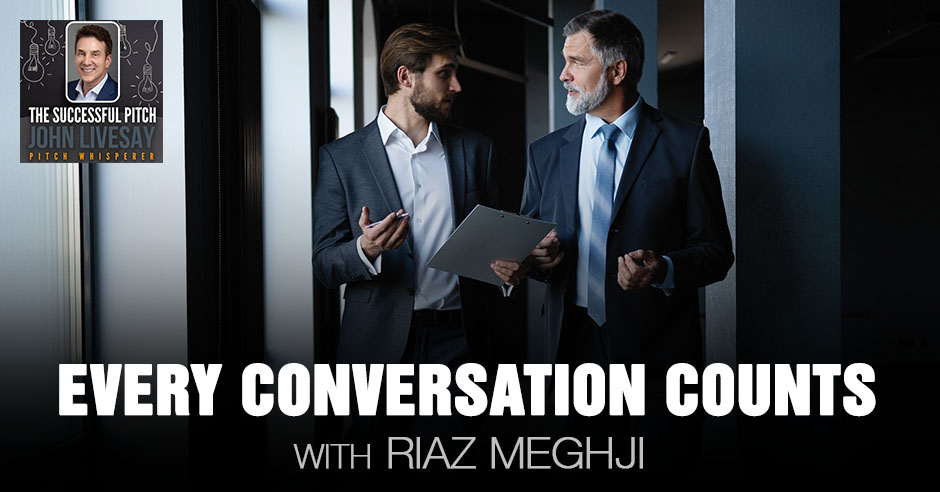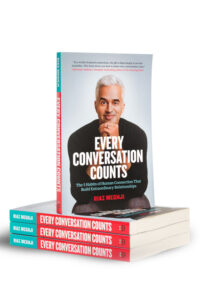Every Conversation Counts With Riaz Meghji
Posted by John Livesay in podcast0 comments

Every conversation counts. They may seem so trivial most of the time, but they are actually key to making significant connections that lead to extraordinary relationships. But sometimes, we get so caught up in our own lives that we forget to ask the right questions, or we simply don’t know what to say. That’s why in this episode, we have human connection expert Riaz Meghji to talk about how conversations spark connections and shape our lives! He shares valuable insights from his book, Every Conversation Counts: The 5 Habits of Human Connection That Build Extraordinary Relationships. Riaz also touches on what to say and how to help someone dealing with grief. You don’t have to be a genius at conversation – just try out new things and keep listening. Tune in now!
—
Listen to the podcast here
Every Conversation Counts With Riaz Meghji
Our guest is Riaz Meghji, who is a Human Connection Keynote Speaker. He talks about how to build connection, which leads to trust and all-important emotional engagement. He has two amazing questions that you can ask someone when they’re grieving the loss of a parent. You don’t want to miss this. Enjoy the episode.
—
Our guest is Riaz Meghji, who is a Human Connection Expert and the author of the book, Every Conversation Counts: The 5 Habits of Human Connection that Build Extraordinary Relationships. His insights have been featured in Fast Company, Harvard Business Review, and Financial Post. After one conversation led him to take a dramatically different career path that changed his life for the better, he became dedicated to exploring the ways that authentic human connection can change lives and organizations. In addition to being a respected thought leader and author on the topic of human connection, Riaz is also an accomplished broadcaster with many years of television hosting experience. He’s interviewed experts on current affairs, sports, entertainment, politics, and business. Riaz, welcome to the show.
John, I feel like this was meant to be, the two of us talking about conversations and stories. It’s great to be here. Thank you.
You are a natural storyteller, and you know how to teach people how to ask questions in difficult situations. We’re going to get to that in a minute. Your bio teases out that little conversation that took a dramatically different career path. I know the answer to it, but I’d love you to share it if you don’t mind, your own story of origin. You can go back to childhood or wherever you want, “Here’s what interested me, and then I thought I was going to do this, and then I did that instead.”
Thanks for opening with this one. It’s so interesting because it’s such a relatable question, “What is your origin story?” For the work that I do and hopefully, invite the audience to think about defining conversations and defining moments, what is one of the most important conversations that changed the trajectory of your path? For me, it goes back a few decades. I was finishing my Finance degree at Simon Fraser University, living my parents’ dream. Not my own South Asian family if you’re not a dentist or financial expert.
An investment banker, yes.
[bctt tweet=”Assertive empathy is the key to connection. Ask questions that show empathy.” username=”John_Livesay”]
You’ve got a few options. In my final semester at Simon Fraser University, I was enjoying the art of presentation. I was presenting at a conference in Quebec City in my final semester. I was fortunate enough to have the co-chair of that conference. He’s still a friend to this day. He sat in on some of my sessions, and they were HR sessions for a student-run group, an international student exchange group.
He pulled me aside at the end of the conference and said, “I know you think you’ve got your life figured out at the age of 22, but I don’t think you should go into Finance.” I remember looking at him and thinking, “Okay.” He said, “From what I saw on stage and your age, you should take a year of your life and explore what’s out there in the presentation space, maybe something on TV.” This was the first time I truly thought about this as a profession. I thought, “That is a compliment, but you recognize my parents are South Asian, so there are expectations here that we need to uphold.” He did not hesitate when he leaned in. He challenged me and said, “When are you going to stop playing safe and start living your life?”
That question is at any age, not just when we’re young in our twenties. Now, as we get older, we get responsibilities, mortgages, and whatever, but this concept of, “We no longer take risks in our life,” you stop taking risks after a certain age is a myth that I would like to bust because we should always be asking ourselves that question, “Am I playing it safe?” What you mentioned that somebody saw on you is what I saw in another guest, Tucker Bryant.
With that kind of talent at such a young age who had a similar trajectory from England, Stanford education, and worked at Google, he was on that path. He was like, “I’m going to be a keynote speaker about poetry and leadership.” Talk about explaining that to mom and dad. What somebody did to you was pointing out that talent. Once you and I have the opportunity to spot that in somebody else at that age, or they’ve already made the decision to do the riskier choice, but it’s their passion, we can double down and say, “That was a good choice. We see why you did it.” That’s the joy of paying it forward or paying it back however you want to look at it.
To build on that, I think back to the gift that the co-chair was able to give me at that moment. It also is a great reminder that he was making a statement, but he was also allowing me to reflect and ask myself the question, “Am I living the life that I truly want to live? Am I playing this game of life safe?” The big opportunity for all of us is to ask first and talk second to have breakthroughs in our conversations because we could feel we’ve got the greatest advice to give to somebody.

Every Conversation Counts: The 5 Habits of Human Connection That Build Extraordinary Relationships by Riaz Meghi
The conversations you have on this show about persuasion and influence, we cannot motivate, persuade, or influence anybody unless or until we connect with them first. The power of connection starts with the power and quality of the questions we ask. When you have somebody that has seen something that is leaning in with that type of precision, it’s not only a compliment. It’s his opportunity to call me up at that moment and not call me out. That is what true leadership is with storytelling on the questions that we ask ourselves, “How can we call each other up in important moments?”
As a keynote speaker, you’re going into organizations, helping them have better connections with their team and with their clients. You also have this wonderful video talking about you and your brother suddenly losing both of your parents and how to deal with that grief. It’s going to happen to all of us. We’re going to have a situation where we have to grieve, or someone we care about is experiencing loss in their life. Most of us are stuck with the platitudes we see on TV of, “I’m sorry for your loss.” You came up with some incredible questions to ask people while they’re in that state of grief.
I’m going to repeat the questions for you because I want you to then give us some of the experiences and some of the answers you’ve gotten to these questions. That could be a loss of a job or a pet. Grief is grief. It’s different degrees. Let’s say it’s the loss of a parent. The question that hit me was, “What do you want me to know about them?” That person gets to decide. It’s a legacy. The other part is, “What is giving you comfort now?” I thought those were brilliant.
I’ve never heard anyone ask those questions in that situation, and that’s why you’re a thought leader, successful, and in demand. My first thought of, “What gives you comfort now,” makes us look for something. When you’re in that grief, having experienced it with the loss of my dad, nothing’s giving me comfort at the moment, but I have to try and find some answer. Nobody wants to say nothing because you’re still here remembering them, talking about it or whatever it might be. As a former journalist and now keynote speaker on this human connection, how did you come up with those amazing questions?
I’m glad that you introduced this in the conversation. These are probably some of the most powerful moments that come out of the keynote, especially when we talk about one of the habits in the book of assertive empathy. If you’re reading this, and you’ve gone through loss, or you know someone that is going through loss, and you want to be there for them, and you’re not sure what to do or what to say, “What do you want me to know about them,” has been a game-changer question.
[bctt tweet=”Use the power of your curiosity to feel that challenge in front of you to avoid fixing the wrong problem.” username=”John_Livesay”]
I realized before I experienced loss, my brother, my wife, and myself going through this, I had failed everybody that had experienced loss before I experienced it myself. In my mind, I thought, “I don’t want to trigger them, so I’m not going to bring it up. They probably don’t want to talk about it.” I’m making assumptions in my own mind to soothe myself from that discomfort, forgetting about the person in front of me. What do we all do at the moment? You articulated that when something goes wrong, and if there’s loss or some element of grief, it’s autopilot mode, “I’m so sorry for your loss, thoughts and prayers. Let me know if you need anything,” and then what do we do? We step back, and that person is left all alone.
In this message of human connection, I talk a lot about how we combat loneliness. Grief is a huge part of loneliness because you feel like no one can relate, no one can understand, and you feel like you’re drowning. In the early part of 2020, I volunteered with Canuck Place Children’s Hospice every year for their Gift of Love Gala. I found myself in conversation with the Lead Counselor of Canuck Place, Deb Davison. I credit her with this question because she does incredible work to lift parents who have faced the unimaginable circumstance of having lost a child.
She not only is there to support them, but to elevate them, so their parents can take the stage and motivate a community to support the hospice. It’s incredible. I remember saying to Deb at that moment. I was four months removed from the sudden loss of my father and never had truly dealt with grief. I looked at her and said, “Deb, how do you do this? I am profoundly struggling with this notion of grief. How do you do this work? What is the best thing you can say to somebody?”
She reframed my perspective and approach to this question. She said, “It isn’t about what you can say. It is about what you can ask.” When I asked her, “What’s the best question you can ask somebody?” she introduced the question, “What do you want me to know about them?” What that person on the other side needs the most at that moment is to share a piece of that person, their legacy, their story, and ultimately their connection to that person and why it mattered so much. When she said that to me, I remember looking at her and said, “I will never forget this gift you gave me. Thank you.”
Every single person that I knew had lost someone from that point on, one, I recognized my failure in being able to support them wasn’t because of malicious or selfish intent. I just didn’t know. Now, I encourage others to lean with curiosity. What do we all do when the conversations hit a roadblock? Sometimes we fall into the trap of trying to fix it too fast. I encourage others to use the power of their curiosity to feel that challenge in front of them before they fix it, so they’re not fixing the wrong problem and that person is truly feeling seen, heard, and valued in their darkest hour. That person on the other side, as you know, John, will not forget it when you were there to lift them up.

Conversation Counts: Grief is a huge part of loneliness. You just feel like no one can relate or understand you, and you feel like drowning.
That’s what good leaders do. They make their team feel seen, heard, and appreciated as people and not cogs in a wheel. You mentioned in your book, Every Conversation Counts, there are five habits to build these connections, and one of them is assertive empathy. My question is, what determines whether something’s assertive empathy versus regular old empathy?
I love the distinction here. I believe the idea of assertive empathy is leaning in with that empathetic curiosity, even when the conversation is difficult. It’s easy when the emotions aren’t heightened to be empathetic. When it’s difficult or you potentially disagree with someone, there is such an opportunity to understand how you get to that conclusion and the power of our questions and these types of scenarios. I’ll give you some examples.
Think about the idea when someone or I could come to you and say, “John, I presented on stage. Can you give me some feedback?” Before you jump in with that feedback, there’s an opportunity with your assertive empathy to say, “How do you feel that went?” and that’s the opportunity for me to start articulating first and doing that work of reflection. Maybe I’m at a roadblock, and you could simply say to me, “What do you feel is impossible in your life now, Riaz?”
I could express all of this pain, and then you could simply reframe and say to me, “What do you think would make this possible? What’s the first step in making that possible?” You’re not giving me any of the answers, but you are that assertively empathetic guide to unlock the answers that I already have within. I’m just asking for a soundboard that will help me through it and a strategic partner that will ask the questions, that notion we talked about, that will call me up in these moments and not necessarily call me out. It’s an empathetic form of accountability.
Before the show, we had a little bit of a conversation about you being on camera, hosting television, producing segments, and how part of that job and the producers get pitched all the time to have people come on the show and either pitch their book or be an expert on a topic. When people were pitching you to come on your shows, the CityTV Breakfast TV or MTV Canada, what made you say, “I can see that as a great segment,” and what would make you go, “There’s no way I’m having that person on?”
[bctt tweet=”One of the ways to establish trust is putting aside our perfect persona and going first with vulnerability.” username=”John_Livesay”]
The one clear factor that I’d always look at in every single pitch, whether this would be a winner in a 5 to 7-minute live television segment or a complete self-indulgence was looking at this pitch, and is this pitch saying how great this subject is, or is this pitch saying how great the audience can be after this 5 to 7 minutes on TV?
That’s what we do as keynote speakers. We’re all about, “What kind of impact can I have on making this audience’s life better?” Not, “Is the audience impressed with me?” It’s the opposite, but, “How can I serve them?”
I liken it to philosophy, and the whole philosophy behind the book was, “Look at you is greater than look at me.” I believe the interviews that truly resonated, whether we had subject-matter experts or even higher-profile celebrities that came on the show, weren’t about anything that I said. It was the questions that gave them the space to share where they’d say, “I like that guy. He’s on my side,” and giving them space. It’s not only the power of the pitch. If you truly want to impact that audience and move that audience to action, one of the things that I found was the ability for all of us as communicators to embrace the power of productive silence.
What does productive silence look like? More importantly, what does it sound like?
It’s giving the audience space. You, as a keynote speaker, have such great wisdom in the stories you tell. You could give that audience a nugget. Instead of moving to that next point after you drop your knowledge bomb, give them a moment.

Conversation Counts: A strategic partner that will ask questions again is an empathetic form of accountability.
It’s like what I did with you earlier. You said some amazing things like, “Let’s pause here for a second. Let me repeat that for people to digest that.” Is that an example?
Yes, letting it breathe. I feel like there’s this sense of urgency, and maybe because modern culture emphasizes convenience and efficiency. Things move so fast. I’m a firm believer that sometimes efficiency can be the enemy of human connection. How can we slow down these conversations and truly hear each other? You throw something out like, “That resonates with me. I want to reflect on this. Let’s dive into that.”
It’s almost suspending your judgment, your assumptions, and your script. You had beforehand of, “Here’s where I was planning on going with the interview, but you gave me something that I didn’t think was coming. Let’s lean in here.” That’s how you can have a conversation that will be memorable for both sides, where if they can say, “I’ve never shared that before,” that is a gift that you gave them the safe space to do that.
One of the things that really stands out for me watching your keynote speaker video is you have this amazing journey you take the audience on. It’s the awareness that many people are experiencing loneliness personally and at work. Just because you’re in an office doesn’t mean you’re not lonely. Once you show people how to have better connections, that builds the all-important trust, which then builds the engagement for the team to be productive. The same thing is true in sales. You need to connect with that person.
Sometimes that means being a little vulnerable, and that builds trust. You then can have an engagement with that potential buyer or person who’s going to decide whether they’re going to have you on their show or hire you as a speaker. People forget that we, as speakers, have to often pitch ourselves as to what the experience would be like if we’re the speaker that gets hired. That is true in almost every industry, whether you’re a doctor, lawyer, or architect. We’re all having to have some emotional connection. As you said, this efficiency being the enemy of connection, it’s not about how many facts and figures we spiel out, is it?
[bctt tweet=”If you are playing safe, how could you take a small risk every single day and put yourself out there?” username=”John_Livesay”]
No. The facts and figures are going to be vital for the analytical mind, but to make that message sticky with storytelling, you’re going to use powerful metaphors. How do we amplify the emotion at that moment for them, so they truly feel the message? Vulnerability is a big part of this. There’s the notion of, “I think about sales. With your audience, I think about persuasion.” Trust is a huge component of this equation. How do we truly establish trust?
One of the habits I champion is putting aside our perfect persona and going first with vulnerability. Some leaders say to me, “When is it oversharing? When is it too much?” You’re like, “This isn’t the right space and time to do that.” There is a powerful concept in psychology known as the Pratfall Effect, where if you’ve done the work to convey your competence and show that you are that point of authority, are reliable, and establish credibility, your vulnerability will then become a powerful tool to draw people closer and embrace connection.
If they’re questioning your credibility, and then you floor the gas pedal with the vulnerability, that share could fall flat and create distance instead of connections. It’s important that we also convey credibility before vulnerability, but both sides are an important part of the equation to amplify emotion and ultimate impact and motivation for the audience to move.
There is an art to it like there is in selling or storytelling. Everything has a delicate balance. If you’re making a meal, and you over-season something, it ruins the meal. The same thing is true when there’s an order to a recipe for a reason. That makes sense in my head that this has to come first for a reason, and then you add that as opposed to willy-nilly and throw it in any order or any amount. That’s not how you make anything connect as it were.
The science and psychology of the formula are very important, but the formula itself should not be more important than authenticity. Some people would say, “Aren’t you manipulating the person in front of you or the audience or the person you’re trying to sell to?” It’s being who you are. If that fits with who you are, and it’s an authentic display, people will be pulled towards that. If they say, “You’re following a script or a formula. I’m going to back away from that,” nothing trumps authenticity. Authenticity and vulnerability, if we talk about the ingredients of the entire equation, are vital in any message and platform that we’re going to convey.

Conversation Counts: Every audience reacts and responds differently to a particular content. One of the best audiences is the new one who is willing to be open and embrace the message of human connection.
Who’s your favorite audience to speak to?
It’s a real interesting question that makes me think because a lot of strategists will say, “Who is the target audience?” With the message of human connection, there are moments when I’m talking to groups in the HR space with leadership, culture, and collaboration. There are times that I’m talking about how to win customer loyalty. There are times I’m talking about how to grow sales through authentic connections. I feel like there are always two teachers in the room, and every audience is a profound teacher.
To be honest, and this is an indirect way to answer your question, every audience has been this profound teacher where I wait for the moment. In a lot of the keynote, what I do is create a space for interaction. I try to reframe the Q&A into a Q&I that instead of questions and answers and telling them the answers, I try to prompt them to generate their own ideas, so we have a conversation. This isn’t just a sage from the stage. I find every audience is different in how they react and respond to the content. My favorite audience is a new audience that is willing to be open and embrace this message of human connection.
If people want to reach out to you, your book, Every Conversation Counts, is on Amazon. If they’re interested in engaging you for coaching or speaking, it’s your website, your name, RiazMeghji.com. Any last thought or quote you’d like to leave us with?
The final thought about the opportunity we have in any conversation is asking ourselves, “Am I in autopilot mode here? Am I in autopilot mode, showing up with the people I already know?” Sometimes when they’re familiar to you, maybe it’s a lifelong friend, we’re in autopilot mode thinking, “I don’t need to be curious.” What is one thing you can discover about someone you already know?
One of the most profound conversations I had in my career interviewing people for a living for decades was with the late great Wayne Dyer. The reason I introduced this idea of, “Am I in autopilot mode? How do I get intentional with my communication?” whether that’s reaching out, asking more questions, or embracing the power of productive silence, comes down to how we can all create new experiences for ourselves.
I remember I asked Wayne Dyer in the week of his 74th birthday, “What is one of the most important conversations you have when you celebrate the milestone that is your birthday? If I’m lucky enough to make it to that point, I’m curious. How do you celebrate?” He did not hesitate. He looked at me, laughed, and said, “That’s easy. I asked myself a question.” I said, “What’s the question you ask on your birthday?” He said, “Did I live 74 years, or did I live the same year 74 times?” I remember looking at Wayne and saying, “Happy birthday to us. That is a gift.” That always stuck with me. I encourage your audience.
If you’re reading this, ask yourself day in and day out, “Am I in autopilot mode in my conversations?” If you are playing safe, how could you take a small risk every single day and put yourself out there, whether that’s leaning in when the conversations are difficult, having the courage to ask for help when you’re struggling, or maybe intentionally celebrating one another? After reading this, reaching out to somebody right now and saying, “I’m thinking about you. I miss you. Can we get together?” Watching the difference and the small actions in our conversations build profound relationships in our lives.
Thank you so much for helping us all connect better, feel a little less lonely, and have some new wonderful questions to ask so that we can practice assertive empathy.
John, you’re a gift. Thanks for creating these conversations, and thanks for having me on. This was meant to be.
It’s my pleasure.
Important Links
- Riaz Meghji
- Every Conversation Counts: The 5 Habits of Human Connection that Build Extraordinary Relationships
- Tucker Bryant – Past Episode
- Video – Losing Your Parents
- Canuck Place Children’s Hospice
- Gift of Love Gala
- Better Selling Through Storytelling Method Online Course
Wanna Host Your Own Podcast?
Click here to see how my friends at Podetize can help
Purchase John’s new book
John Livesay, The Pitch Whisperer
Share The Show
Did you enjoy the show? I’d love it if you subscribed today and left us a 5-star review!
- Click this link
- Click on the ‘Subscribe’ button below the artwork
- Go to the ‘Ratings and Reviews’ section
- Click on ‘Write a Review’
Love the show? Subscribe, rate, review, and share!
Join The Successful Pitch community today:
- JohnLivesay.com
- John Livesay Facebook
- John Livesay Twitter
- John Livesay LinkedIn
- John Livesay YouTube
Tags: Accountability, Building Trust, dealing with grief, Embracing Vulnerability, Productive Silence, Strategic Partners
